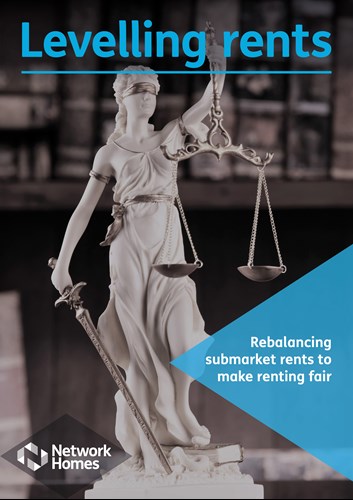Network Homes proposes fairer social housing rents
19 October 2022
We've launched a new report which proposes rebalancing submarket rents in order to establish a fairer social housing rent system and scrapping the household benefit cap.
The Levelling Rents report argues that high affordable rents reduce living standards and work incentives. Social landlords could reduce the number of high affordable rents by raising rents which are below the target average.
The household benefit cap currently means that some of the poorest households in the country are being hit hardest by the rising cost of living – and if government doesn’t change the cap will gain no protection by overall rising levels of benefits.
Raising all below average social rents each year so that they are on average £2 more per week above their usual yearly rent increases would allow for the highest affordable rents to be reduced over time.
Currently social landlords can raise rents by the Consumer Price Index in September plus 1% per year, which would mean rents could increase by 11.1% - when most housing associations are facing costs rising at a much higher rate (e.g. cost of maintenance is increasing by 15% per year). But this is likely to change from April 2023 following the Government’s recent consultation on capping on social rent increases at either 3, 5 or 7%. Previously, the Government reduced rents by one per cent a year through 2016-2020.
The report finds three major problems with the current social rented system:
- It’s complicated which makes it difficult to explain to residents and costly to administrate for landlords.
- It’s unfair, in the sense that properties of the same size and quality, in the same location, are sometimes charged different rents.
- It involves some rents that are often extremely high by traditional standards, i.e. Affordable Rents – which are made less affordable to some families whose benefits are capped.
According to Levelling Rents, the complexity of the current system makes it difficult for social landlords by increasing administrative costs around rent setting and raising the risk of residents being charged incorrect or unfair rents.
The current system also puts a barrier in the way of transparency and trust. Eighty-three per cent of Network Homes residents surveyed said it was important to them to understand why their rent is set as it is. But in the current system, it is difficult to explain in a clear and accessible way why rents are set as they are.

The problem of rents has been parked in the too difficult box for many years. It is time we started to talk about how to get it out of that situation. We need to get into a place where we can confidently say to tenants that the system is fair and equitable for all, regardless of which affordable housing programme produced their home.
Helen Evans, Chief Executive of Network Homes
Helen adds: “A policy of levelling rents would reduce the number of relatively high rents, reinstating work incentives and should be combined with the abolition of the benefit cap. It would also reduce the unfairness of wildly disparate rents which don’t reflect size, location or quality. At Network Homes, such changes would allow us to bring more than 650 of our highest rents down to social rent levels over ten years and more over time.”


